By Evelyn Nguyen, Mar 17, 2025
Are you getting ready for an adventure in Vietnam and wondering, "What currency do I need for Vietnam?" Understanding Vietnamese currency, figuring out money exchange, and finding the best ways to handle your finances while traveling are all crucial for a great Vietnam tour.
No worries, Incredible Asia Journeys is here to clarify your questions! We'll share all you need to know about Vietnam's currency, including exchange rates, where to exchange money, and some tips for buying Vietnamese currency. Don’t skip this crucial Vietnam Travel Experience and Tips!
What is Vietnam currency? Historically, Vietnam has had a different former Vietnam currency, but the đồng has been the official currency since 1978. Vietnamese đồng is the official Vietnam currency name, abbreviated as VND. The Vietnam currency symbol is ₫, which you'll see on price tags and receipts throughout the country.
So, when traveling in Vietnam, what is the best currency to use in Vietnam? While the official currency is the Vietnamese đồng, US dollars are also accepted in many tourist areas and major cities such as Hanoi, Ho Chi Minh City, Da Nang,... However, for smaller transactions and to get the best value, the best currency for Vietnam is use VND.
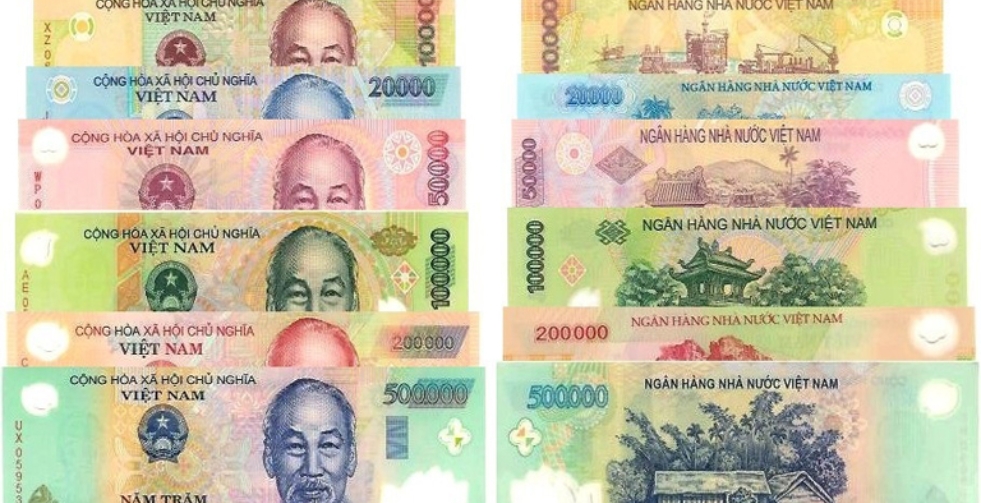
Some notes of Vietnam currency
The Vietnamese đồng comes in various denominations, making it convenient for different types of transactions. These include smaller notes such as 1,000 VND, 2,000 VND, and 5,000 VND, as well as larger notes like 10,000 VND, 20,000 VND, 50,000 VND, 100,000 VND, 200,000 VND, and 500,000 VND.
It's worth noting that the value of the Vietnam currency is quite large, with many zeros, which can often confuse tourists. For example, a meal might cost 100,000 VND, which can be overwhelming to those not used to dealing with such high numbers. Due to this, it's common for tourists to feel confused when handling the currency. Understanding Vietnam currency and being familiar with all the notes can help you manage your money more effectively during your trip.
What is Vietnam currency exchange rate? Let’s find out the general Vietnam currency exchange rate compared to your home currency such as Vietnam currency to USD or Australian to Vietnam currency and so on! Exchange rates fluctuate, so it's advisable to check the current rates day by day before your trip. As of 2024, the up-to-date Vietnam exchange rate 2024 is approximate as below table.
Currency | Currency Code | Exchange Rate (to VND) |
US Dollar | USD | 25,192 |
Euro | EUR | 27,290 |
British Pound | GBP | 32,386 |
Australian Dollar | AUD | 16,454 |
Canadian Dollar | CAD | 18,248 |
Japanese Yen | JPY | 168 |
Indian Rupee | INR | 301 |
Singapore Dollar | SGD | 18,867 |
Chinese Yuan | CNY | 3,484 |
Note: These are the Vietnam currency exchange rates in the mid-year 2024, the rates fluctuate frequently, so it's important to check the current rates daily.
Coming to Vietnam, there are various ways to exchange money, here are some trusted resources to ensure your exchange process!
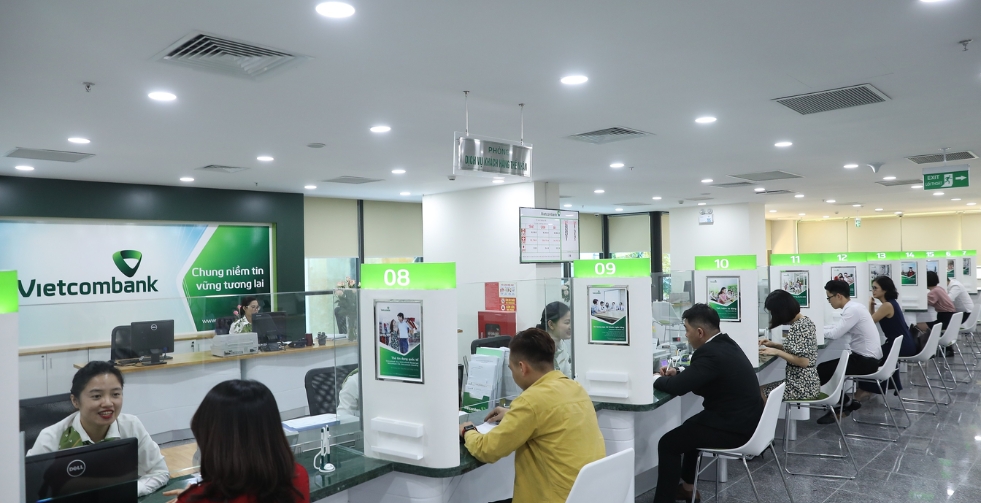
Exchanging money at banks in Vietnam
Exchanging money at banks in Vietnam is a reliable and secure option. Banks are widely available in cities and towns, though they may have limited operating hours from Monday to Friday between 8 AM and 4 PM. The fees at banks are generally free, and they usually offer reasonable exchange rates.
Banks provide accurate and fair rates, making them a competitive choice for currency exchange. Remember to bring your passport for identification and be prepared for possible wait times, especially in busy branches. Major Vietnam banks that you should take into consideration include Vietcombank, BIDV, and VietinBank.
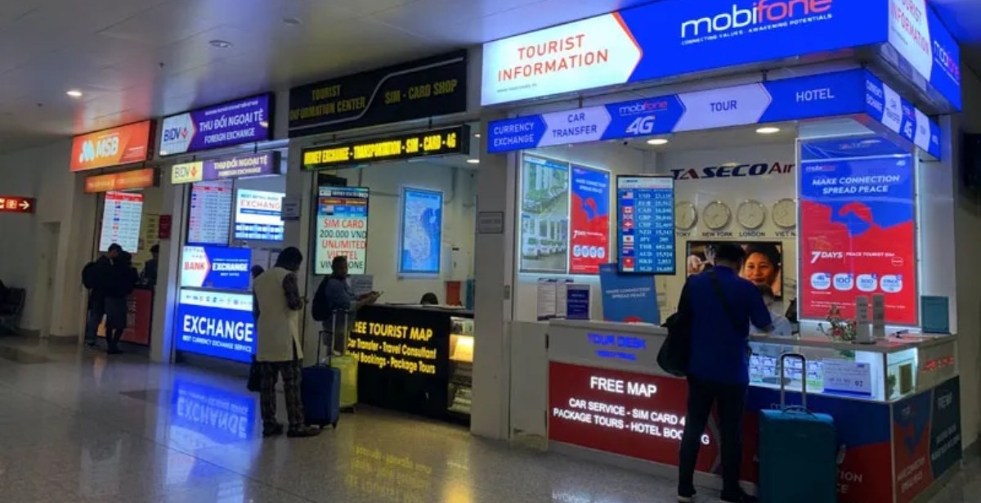
Exchange counters at international airports in Vietnam
Exchange counters at international airports in Vietnam offer high convenience, as they are readily available upon arrival. However, this convenience comes at a cost. Airport exchange services often impose higher fees, and their exchange rates are generally less favorable compared to other options.
When you're at Vietnam's international airports, like Noi Bai International Airport in Hanoi, Da Nang International Airport in Da Nang, or Tan Son Nhat International Airport in Ho Chi Minh City, you'll find handy currency exchange booths. It's advisable to use airport exchanges for small amounts or in emergencies. If possible, avoid exchanging large sums at the airport due to the higher fees and less favorable rates.
Many hotels in Vietnam offer currency exchange services at the front desk, providing a high level of convenience for travelers. However, hotel exchange rates are typically worse than those offered by banks or ATMs with higher fees. It's best to use this option for small amounts or emergencies and to check the rates before exchanging large sums.

Gold and jewelry shops in many cities offer good exchange rates
Gold and jewelry shops in many cities offer good exchange rates, often better than banks and hotels. These shops tend to have low fees and provide very favorable exchange rates.
However, it's crucial to ensure that the shop is reputable to avoid counterfeit currency. These shops may not always provide receipts. Popular areas for gold and jewelry shops include Hanoi Old Quarter and Ho Chi Minh City's District 1.
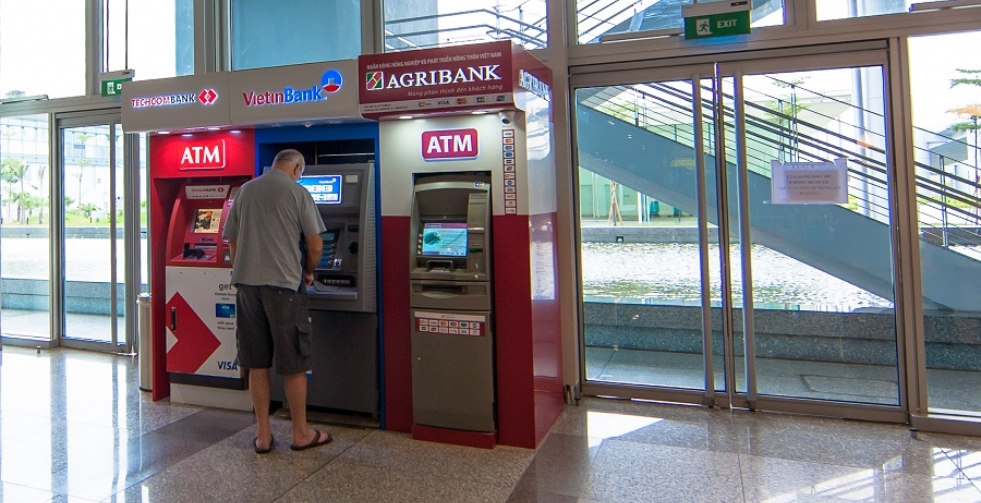
Exchange Vietnam currency in ATMs
ATMs are easily found in urban areas throughout the country and in tourist areas in Vietnam, providing great convenience for tourists. Fees for using ATMs can vary, as both your home bank and the local ATM operator may charge fees, typically ranging from 1-3% per transaction.
ATMs often use interbank rates, which are favorable. Before traveling, check with your bank about international withdrawal fees and be aware of daily withdrawal limits. Common Vietnam banks with extensive ATM networks include Vietcombank, Agribank, and Techcombank.
When traveling in Vietnam, it's essential to know when to use cash and when to use a credit card.
Like other countries, in Vietnam, the most popular way to pay for things is cash. You can use it almost everywhere, like at street markets, restaurants, and stores. Some small places and rural areas might not take credit cards, so it's good to have some cash with you. It's best to have a variety of bill sizes because smaller shops might not be able to give change for large bills.
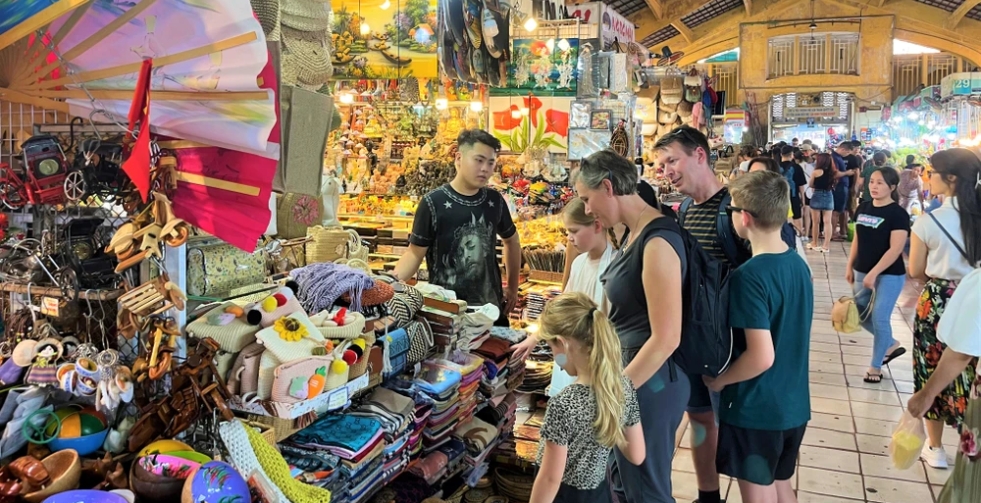
Using cash is more convenient in Vietnam markets
Credit cards are accepted in many hotels, large restaurants, and major shopping malls in urban areas in which MasterCard and Visa are the most widely accepted. However, be aware that some places may add a surcharge of 2-3% for card payments. It's also a good idea to inform your bank of your travel plans to avoid any issues with your card being declined due to suspected fraud.
Before exchanging money in Vietnam, here are some helpful tips to keep in mind.

Buy things from Vietnam street vendors
Exchanging money in Vietnam is straightforward with a bit of preparation. If you prepare your Vietnam tour packages with Incredible Asia Journeys, we'd be happy to assist you with payments in advance so you can make wise choices that help you save money and have the local currency you need for your trip. So, don’t hesitate to reach out to us for a hassle-free Vietnam travels!